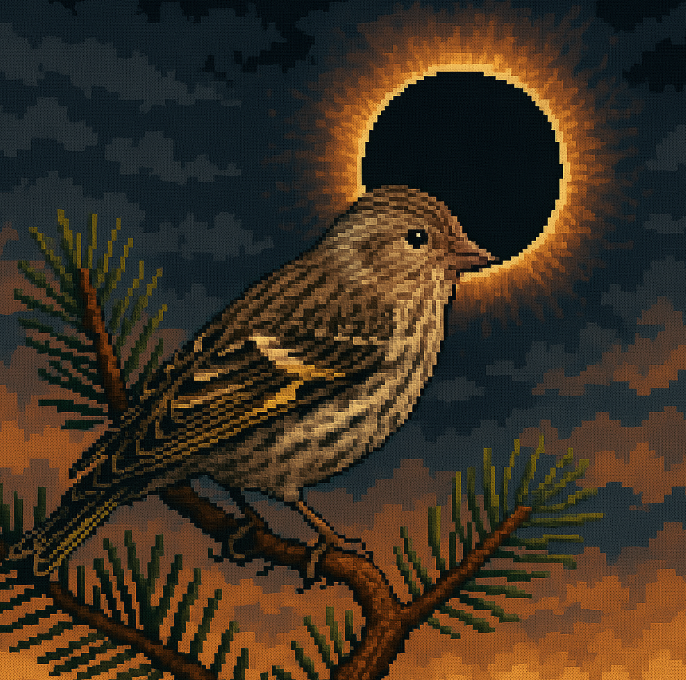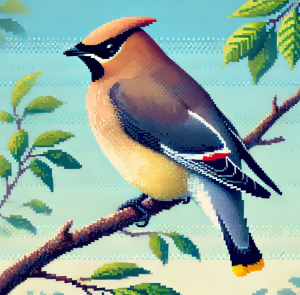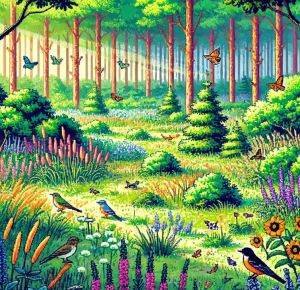
Did Birds Stop Singing During the Eclipse? The Solar Surprise Hidden in the Silence
It’s been a year since the AMAZING solar eclipse in America on April 8, 2024.
For years, folks have whispered about animals getting weird during solar eclipses. Dogs whimper. Chickens roost. Cows head to the barn. But birds? Some people say they vanish into the quiet, like nature’s volume knob suddenly turned all the way down. I didn’t really notice anything, but my attention was kind of elsewhere.
Turns out, that isn’t just a tall tale.
Thanks to a first-of-its-kind, continent-spanning experiment powered by regular folks and AI bird-listening boxes (yes, really), scientists finally answered the question: Do birds actually stop singing during an eclipse?
The answer: Yep. But not always. And not everywhere.
Meet the Haikubox: Your Backyard’s Birdy Eavesdropper
Let’s rewind. A team of scientists teamed up with hundreds of curious bird-lovers who had installed nifty little devices called Haikuboxes in their backyards. These are like Alexa, but instead of playing music, they listen for it—specifically, bird songs. Each box uses a neural network trained on over a thousand bird species to detect who’s chirping nearby and when.
On Eclipse Day, April 8, 2024, over 340 Haikuboxes sat silently listening from Texas to Maine, from Mexico to Canada, as the moon blotted out the sun in a dramatic celestial curtain call.
But this wasn’t your average birdwatching. This was machine-powered bird science—no binoculars required.
Lights Out, Mics On
What the Haikubox network captured was both expected and surprising.
- In places where the sun was 99% or more blocked, birds started quieting down about 10–30 minutes before peak darkness.
- During the darkest moments? A sharp drop in vocalizations.
- Then, like flipping a switch, songs picked up again once the light returned.
But here’s the twist: This didn’t happen everywhere. Places with only a partial eclipse—say, 70% obscuration—showed almost no change. To a bird, it was just a cloudy afternoon.
And even in totality zones, some birds refused to play along.
The Birdy Rebels
Take the American Robin, for example. In Kentucky, one robin belted out its full repertoire right through totality, like it was auditioning for Bird Idol. In Maine, though, Pine Siskins went radio silent. Meanwhile, in Vermont, the Black-capped Chickadee kept singing during the eclipse at one site… but completely clammed up at another.
Same species. Same eclipse. Totally different vibes.
Scientists were puzzled. They checked for patterns—maybe weather played a role? Nope. Temperature, wind, humidity, even latitude didn’t explain the differences. It seems that bird behavior, like bird fashion, is full of quirky individuality.
The Eclipse Effect: It’s All About the Darkness
So why the silence? Researchers think that in places of full totality, the sudden darkness fools birds into thinking night has come early. Cue nighttime routines: stop singing, find shelter, maybe take a power nap.
But—and this is key—the change had to be dramatic. Even 95% obscuration, which feels pretty darn dark to us, didn’t cut it. Only in the deepest shadow, with over 99% of the sun blocked, did birds consistently hush.
It’s like a group of friends who only take off their sunglasses if everybody agrees it’s nighttime.
Bigger Than Just Birds
This study isn’t just a cool bird factoid. It’s proof that citizen science and AI are changing how we do ecology. Instead of relying on a few researchers with clipboards, we now have a massive, distributed microphone network that can detect how animals react to big planetary events—not just eclipses, but also wildfires, storms, even climate change.
And here’s the best part: These Haikuboxes were in people’s yards. Regular homes. No lab coats required. Just folks who love nature and wanted to lend an ear (literally) to the scientific conversation.
It’s like the Avengers of bird science: each person with a box is their own superhero of sound.
So What’s Next?
This eclipse was a test run. The next big one won’t swing through North America until 2045 (mark your calendars!). But now that we know this network works, scientists plan to listen in during spring migrations, storm events, and wildfire seasons.
They’re hoping to answer even bigger questions:
- How do birds respond to sudden light pollution?
- Can we predict migration shifts based on real-time song data?
- Will AI help us save species before they vanish into silence?
We’re entering a golden age of eavesdropping on nature—for science.
Let’s Explore Together 🐦🌑🎙️
If you watched the eclipse and thought, “This feels… different,” you were right. And now we know the birds felt it too. Want to join the next generation of science storytelling and backyard discovery?
Let’s keep the curiosity going:
- 🐤 How do you think this research could change how we protect birds in your area?
- 🎧 Would you want a Haikubox at your home?
- 🌎 What’s the coolest science moment you’ve experienced in your backyard?
Drop your thoughts in the comments or share this story on social with your own bird eclipse tales! Use the hashtag #BirdsInTheDark so we can find you.
And if you liked this post, share it with a friend who loves science, birds, or just a good ol’ mystery with a satisfying, tweet-worthy ending.
Fight for Science:
The stakes for science have never been higher. In today’s turbulent political climate, staying informed is critical. Subscribe to our weekly newsletter to get the latest discoveries, major breakthroughs, and stories that matter most. Designed for teachers and science enthusiasts, this free resource enhances your teaching and understanding of science in real time. Subscribe today to ensure science stays at the forefront of public conversation! If you liked this blog, please share it—your referrals help This Week in Science reach more people when it’s needed most.



